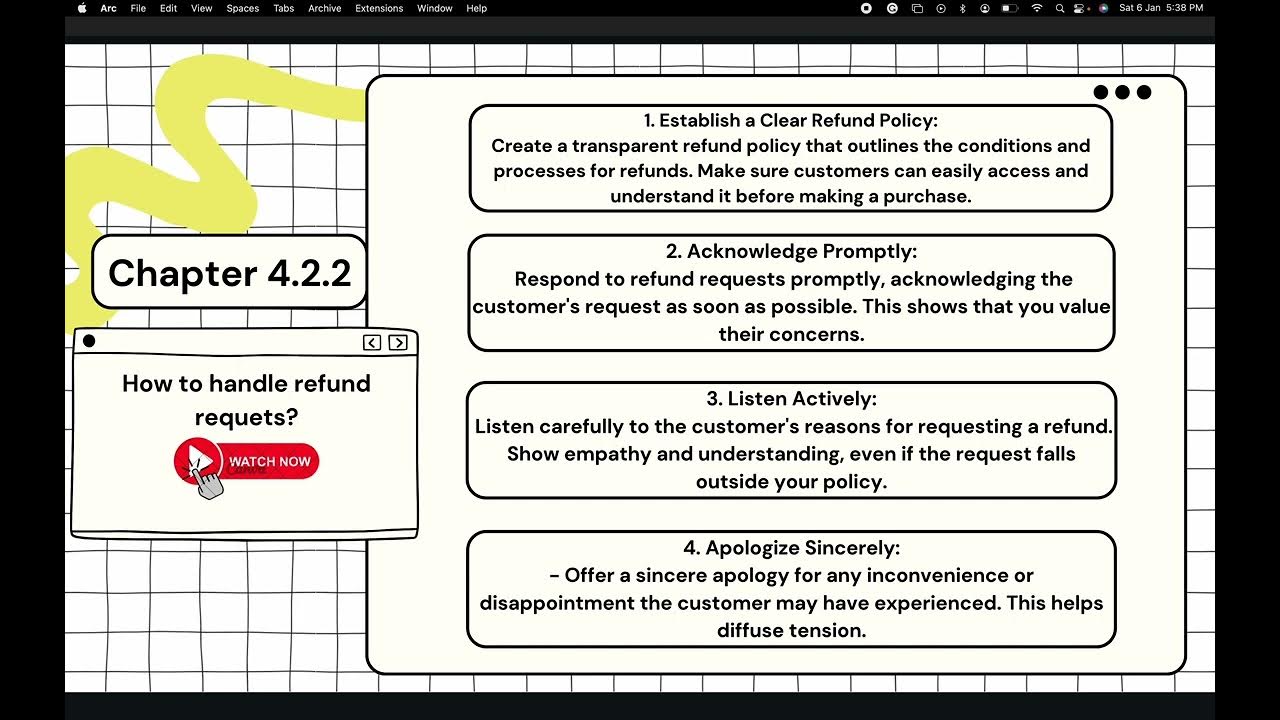Penanganan Pengaduan
Summary
TLDRThis video script discusses the importance of handling complaints in a hospital setting effectively to ensure customer satisfaction. It defines complaints as expressions from customers and highlights three types: active, passive, and professional. The script emphasizes that not all complaints are communicated directly, and some customers may switch to other healthcare facilities without voicing their concerns. It suggests that complaints are opportunities for improvement and learning, and that poorly handled complaints can spread negatively through word-of-mouth. The video advises to listen well, show empathy, avoid blame, and act promptly on complaints to retain loyal customers.
Takeaways
- 😀 Complaints are expressions from customers about products or services, which can be conveyed directly or indirectly.
- 😐 There are different types of complaints: active, passive, and professional, each with unique characteristics and responses required.
- 🚫 Not all customers who have complaints will voice them; some may switch to other healthcare facilities without expressing dissatisfaction.
- 🔑 Complaints can be seen as opportunities for improvement, where customers are giving feedback that can enhance service quality.
- 👨🏫 Complainers are considered as true teachers, providing a chance for the service provider to learn and improve.
- 📊 Complaints can also act as an evaluation tool, helping service providers to assess and enhance their services.
- 💡 If a complaint is not addressed well, it can spread negatively through word of mouth or social media, affecting the reputation of the service provider.
- 👂 The first step in handling complaints is to be a good listener, showing empathy and loyalty without blaming the customer.
- 🙅♂️ Avoid dismissing or belittling the complainer, as this can exacerbate the situation and harm the relationship.
- 🔄 Prompt action is crucial after receiving a complaint; swift response and resolution can lead to customer retention and satisfaction.
- 🤝 Handling complaints well can turn a dissatisfied customer into a loyal one, whereas poor handling may result in loss of the customer.
Q & A
What is the main topic discussed in the video script?
-The main topic discussed in the video script is how to handle complaints in a hospital setting, its impact on customer satisfaction, and the importance of addressing them properly.
What are the different types of complaints mentioned in the script?
-The script mentions three types of complaints: active complaints where the customer directly expresses dissatisfaction, passive complaints where the customer remains silent and may switch to another healthcare facility, and professional complaints where the complainant seeks to gain an advantage.
Why is it important to address complaints effectively?
-Addressing complaints effectively is important because it impacts customer satisfaction and loyalty. If not handled well, it can lead to customers leaving and sharing their negative experiences with others.
What are the potential reasons for complaints according to the script?
-Potential reasons for complaints include customers not receiving enough information, not receiving safe service, not receiving appreciation, not getting the expected results, and lack of proper communication.
How does the script describe a complainant in a positive light?
-The script describes a complainant as someone showing genuine love by giving the service provider a chance to correct their mistakes, as a true teacher providing an opportunity to learn and improve service, and as the best evaluator helping the service provider to grow.
What is the potential impact of not addressing a complaint properly?
-If a complaint is not addressed properly, the complainant may share their negative experience with friends and through social media, potentially reaching more than 91 people and damaging the reputation of the healthcare facility.
What is the first step recommended in handling a complaint according to the script?
-The first step recommended in handling a complaint is to be a good listener, show empathy, and remain loyal to the service provided, avoiding blame and being careful not to insult or belittle the complainant.
What should be the immediate action after receiving a complaint?
-The immediate action after receiving a complaint should be to take the complaint seriously, apologize if necessary, and take swift action to rectify the situation.
How can a complaint be beneficial for a healthcare facility?
-A complaint can be beneficial for a healthcare facility as it provides an opportunity for improvement and growth, allowing the facility to learn from mistakes and enhance the quality of their services.
What is the potential outcome if a complaint is handled well according to the script?
-If a complaint is handled well, the patient may become a loyal customer, contributing to the healthcare facility's reputation and potentially recommending the service to others.
What does the script suggest about the importance of communication in handling complaints?
-The script suggests that effective communication is crucial in handling complaints, as it helps in understanding the issue, showing empathy, and finding a resolution that satisfies the customer.
Outlines

此内容仅限付费用户访问。 请升级后访问。
立即升级Mindmap

此内容仅限付费用户访问。 请升级后访问。
立即升级Keywords

此内容仅限付费用户访问。 请升级后访问。
立即升级Highlights

此内容仅限付费用户访问。 请升级后访问。
立即升级Transcripts

此内容仅限付费用户访问。 请升级后访问。
立即升级浏览更多相关视频

CARA MENGHADAPI KOMPLAIN CUSTOMER

3 LANGKAH MENANGANI KELUHAN PELANGGAN | KELUHAN KONSUMEN

How to handle refund requests?

What are Customer Service Skills? Best Answer For Banking Aspirants | IPB India

36 English Phrases For Professional Customer Service (FREE PDF Guide)

Customer Service/Pelayanan Konsumen
5.0 / 5 (0 votes)
